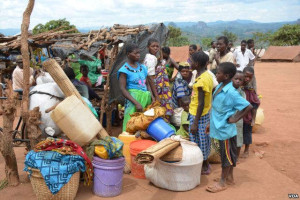Fears for new refugee crisis in Africa
Mozambique is the latest scene of the world’s escalating refugee crisis with conflict between government and rebel forces displacing entire villages.
The United Nations High Commission for Refugees (UNHCR) reports fighting between government and opposition forces in Mozambique is prompting growing numbers of refugees to flee to neighboring Malawi.

Mozambique is part of the world’s escalating refugee crisis
The refugee agency reports nearly 11,500 Mozambicans have fled to Malawi since mid-December. Most of the new arrivals are in the village of Kapise, about 100 kilometers south of Malawi’s capital, Lilongwe. It says others are scattered throughout the neighboring district of Chikwawa.
The UNHCR reports the exodus of Mozambican refugees has been growing and shows no sign of abating.
UNHCR spokesman Leo Dobbs said the authorities in Malawi were finding it increasingly difficult to cope with the rising number of people.
The Malawi government has reopened a former refugee camp to deal with the influx.
Mr Dobbs said during the past month, aid workers had seen the number of refugees arriving in Kapise grew from around 130 a day to around 250 a day.
“Early this year, the refugees we talked to said they were fleeing violence in their villages and more recent arrivals have said that they were fleeing for preventive reasons after fearing imminent clashes between government forces and RENAMO, the main opposition group, which has said it wishes to take control of six provinces in the north of Mozambique,” Mr Dobbs said.
Observers say what is happening in Mozambique is beginning to look like a dangerous replay of its bloody civil war.
And there are concerns the situation will escalate into a new refugee crisis in southern Africa.
The Luwani camp, which Malawi is reopening, previously hosted Mozambican refugees from the civil war period. It was closed in 2007.
Dobbs said the UNHCR shortly would begin moving refugees from Kapise to the Luwani camp. He said the refugees would have better facilities and services available to them and that the camp would be safer than Kapise, which is only five kilometers from the border with Mozambique.
The Mozambican Civil War began in 1977, two years after the end of the war of independence from Portugal.
The ruling party, Front for Liberation of Mozambique (FRELIMO), and the national armed forces of Mozambique (FAM), were violently opposed from 1977 by the Mozambique Resistance Movement (RENAMO) which received funding from white-ruled Rhodesia and later apartheid South Africa.
About one million people died in fighting and from starvation; five million civilians were displaced, and many became amputees because of landmines, a legacy from the wars that plagued the east African nation for more than two decades.
Fighting ended in 1992 and the country’s first multi-party elections were held in 1994.
Laurie Nowell
AMES Australia Senior Journalist












